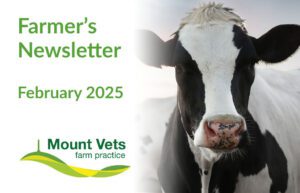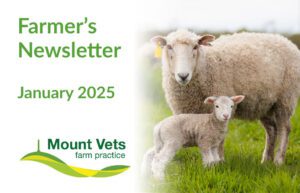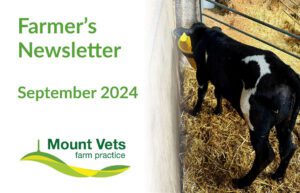February 2025
Here is the latest from our farm team at Mount Vets. If you would like any further advice or would like us to cover something in the next newsletter, please call us on 01823 662286 or contact us here.
We want to hear your feedback… Leave us a review!
We value your feedback and comments and would appreciate if you could take the time to leave us a review! Please follow the link to share your thoughts.
Just a quick reminder to call in as soon as you get your letter from APHA to notify you that your TB test is due. We are approaching a very busy time of year and would appreciate your help with booking your TB tests early.
Many thanks from Mount Vets Farm Reception team.
Why Calving Heifers at 24 Months Makes Sense for Your Dairy Herd
Written by Ollie Judkins
When it comes to managing a successful dairy herd, calving heifers at 24 months is one of the best decisions you can make. It’s a target that can spark debate, but the benefits – both financial and practical – are hard to ignore. Here’s why aiming for that two-year mark is worth it.
Improved Financial Performance
One of the biggest advantages of calving heifers at 24 months is the financial benefit. Raising a heifer from birth to calving is one of the most significant costs in dairy farming. Every extra month past 24 months adds to this expense without any return on investment. By calving at 24 months, you reduce the rearing period, cutting down on feed, labour, and housing costs. This means you start generating income from that heifer earlier, improving your farm’s cash flow.
Higher Lifetime Milk Production
Heifers that calve at 24 months often have a longer and more productive life in the herd. Research shows that these animals tend to have higher lifetime milk yields compared to those calving later. This is partly because they spend more time as productive, lactating cows rather than growing heifers. Additionally, well-managed heifers that calve at 24 months are less likely to experience calving difficulties, leading to better health and fertility post-calving.
Better Fertility and Health
Heifers that calve at 24 months tend to have better fertility rates. When managed correctly, they return to cycling quickly after calving, making it easier to get them back in calf for their second lactation. Good management during the rearing period ensures that these heifers reach their target weights and body condition, which is crucial for successful calving and post-calving recovery.
Efficient Use of Resources
Calving at 24 months means you’re making the most efficient use of your resources. Housing space, feed, and labour are all limited resources on a farm. By aiming for 24 months, you ensure that heifers don’t occupy valuable space and consume resources for longer than necessary. This efficiency can free up space and resources for other stock, leading to better overall farm management.
Genetic Progress
Another often-overlooked benefit is the impact on genetic progress. By calving heifers earlier, you accelerate the introduction of new genetics into your herd. Faster turnover means that the genetic improvement you’re aiming for through breeding decisions can be realised more quickly. This can lead to a more productive, efficient, and healthy herd over time.
Meeting Growth Targets
Reaching the 24-month target does take careful management and good nutrition. Heifers need consistent growth from birth, with key weight targets hit at weaning and breeding. With the right feeding and health protocols in place, it’s an achievable goal that pays off in the long run.
Is It Right for Your Herd?
Every farm is different, but the evidence supporting 24-month calving is strong. It improves cash flow, boosts productivity, and optimises resource use. If you’re not hitting that target yet, it might be time to assess your system and see what changes could help you get there.
If you wish discuss any cases or prevention further, please do get in contact: 01823 662286
Lamb Colostrum Management
Written by Amy Birch
When lambs are born, their immune system is naïve and unable to quickly respond to all the disease challenges they’ll encounter. Colostrum is the first milk that the ewe produces, and it supplies crucial antibodies that allow the lamb to counteract the pathogens in their environment, such as those that cause watery mouth, tetanus, etc. It is also an important energy source for the newborn. For these reasons, the importance of ensuring good colostrum intake cannot be overstated.
Aim: ensure each lamb receives a sufficient quantity of good quality colostrum quickly
EWES
Ensuring lambs have a great start to life begins before the lamb is born. Boosting the ewe’s immune response with vaccination 4-6 weeks before lambing is important to provide optimal antibody levels in the colostrum, especially regarding clostridial diseases such as tetanus which are generally fatal and can be a risk in lambs due to management processes such as applying elastrator rings. Of course there have been issues sourcing vaccines in recent times, but lambs can still get protection by vaccinating them from 3 weeks of age. Vaccination of lambs should be done regardless as the protection from the colostrum starts to wane as the lamb gets older, however it becomes even more important to do this as soon as possible if the lambs didn’t receive colostrum from a dam that received a pre-lambing booster.
Another way to support ewes in producing a large volume of high-quality colostrum is to ensure ewes are supplied with good nutrition, especially during the final few weeks of pregnancy as this is the main period of colostrum production.
LAMBS
Lambs lose their ability to absorb the antibodies in colostrum quite quickly, thus the timing of colostrum feeding is very important. To achieve colostrum intake in the required timeframe, check all lambs within the first 2 hours to ensure they are standing and suckling.
Colostrum Volume Requirements:
All lambs require 50mL per kg of lamb bodyweight in the first 2 hours after birth. The total volume required over the first 24 hours depends on the environment the lamb is entering.
- Housed; dry conditions: 210mL per kg lamb bodyweight
- Outdoors; wet conditions: 280mL per kg lamb bodyweight
The situations that often result in poor colostrum intake are twins/triplets (insufficient colostrum from the dam for all lambs), difficult lambings (lamb and/or ewe might be slow to rise), young ewes (might reject the lamb, or produce poorer colostrum) and thin/sick ewes (low energy and protein in last 3 weeks of gestation will result in poor quality and quantity colostrum). If you are unsure that lambs have received sufficient colostrum for any of the reasons above, it is best to provide colostrum via stomach tube.
Sourcing Colostrum for Stomach Tubing:
The ideal source is milking the colostrum from the dam into a clean container. When milking, storing, or stomach tubing colostrum, it is essential that good hygiene practices are followed. All equipment must be cleaned and disinfected after each use. If you have surplus colostrum that isn’t immediately required (i.e. a ewe lambed but lambs were dead), it is a good idea to freeze it for later use.
Colostrum can be stored in the fridge (4°C) for up to 7 days and can be frozen for up to 6 months. It is important to label containers with the date of collection, and store colostrum in small amounts to make defrosting easier. When warming refrigerated or frozen colostrum, use a warm water bath to bring it slowly to 38°C. Using a microwave or boiling water can raise the temperature to >40°C which will damage the antibodies.
In the absence of fresh or frozen colostrum from the farm, powdered cow colostrum is the next best substitute. Ideally it is only used to supplement what they’ve already had from their dam, but you may need to use it for the whole volume. Powdered colostrum doesn’t have the antibodies specific to the disease challenge on your particular farm, however it is a valuable resource when you don’t have fresh or frozen colostrum available. The product we have available is SCCL, which is a powdered cow colostrum. If you purchase this product for use in lambs we will provide instruction on how it should be used.
Stomach Tubing:
If a lamb is unconscious or unable to lift their head, they cannot be stomach tubed. If lambs are less than 6 hours old, please gently warm the lamb for 1-2 hours (this will hopefully improve their alertness) prior to feeding colostrum. If they are older than 6 hours old and haven’t had a good drink, they’ll be running very low on energy reserves, so please seek vet advice.
Other than ensuring good colostrum management, providing warm and hygienic conditions will help lambs to have a flying start!
Bluetongue Updates
The latest updates, news and advice about the current bluetongue virus (BTV-3) situation in the UK.
For those of you that need to move animals out of a restricted zone to a non-restricted zone:
For full info, and to apply, you must visit the GOV.UK website (https://www.gov.uk/guidance/bluetongue-movement-licences-and-designated-slaughterhouses)
Or phone 0300 020 0301 (choose option 1)
There you must have one of two licences.
- A GENERAL licence if the animals are going to slaughter or a slaughter market. This can be downloaded and must accompany the animals when being moved
- A SPECIFIC licence if they are to move to another holding either directly or via a market. This must be applied for and can take up to 10 days to get an application number
Animals moved under a SPECIFIC licence must be pre-movement tested. This is free if booked through UK Farmcare but that can only be done once a licence number has been issued.
To apply for free bluetongue sampling testing, you must contact UK Farmcare on 0800 612 5289. UK Farmcare will then email us with your request, and we will arrange a time to carry out this testing and email back with this information.
Results can take up to 5 days from when the lab receives them and once they are through, will be sent to the APHA and the licence will be issued.
To read the latest updates and advice on Bluetongue visit:
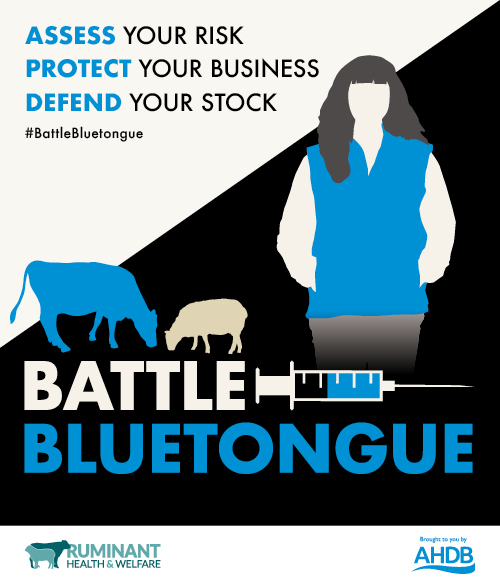
Upcoming courses
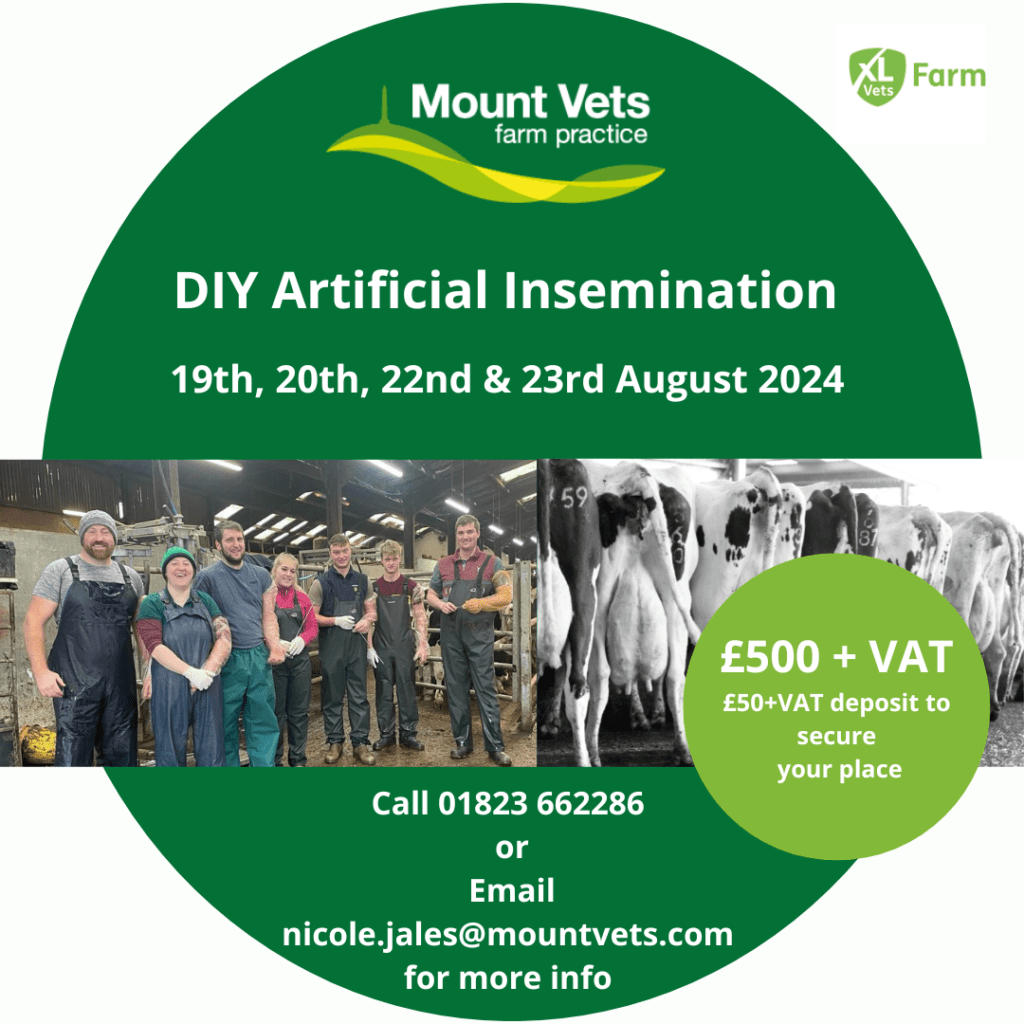
DIY Articial Insemiation Course
Our next 4-day DIY AI course will run on 19th, 20th, 22nd & 23rd August 2024.
This DEFRA approved course is aimed at anyone who has no previous experience in the artificial insemination of cows.
The 4-day course is run by our experienced farm vet Rob Mangham and is full of theory and practical sessions to make sure you leave feeling confident and safe in all aspects of AI.
The cost of the course is £500 + VAT, with a £50+VAT deposit to secure your space.
(Deposit will be taken off final amount)
Please ring the practice to book your place on any of our courses on 01823 662286 or email farm@mountvets.com
Meet the Team!
We have an experienced & friendly team here at Mount Vets. You might already recognise a few faces but over the next few months we will reintroduce you to some of our excellent team. To read more and see more of the faces of Mount Vets visit our team page, and be sure to follow us on Instagram and Facebook.
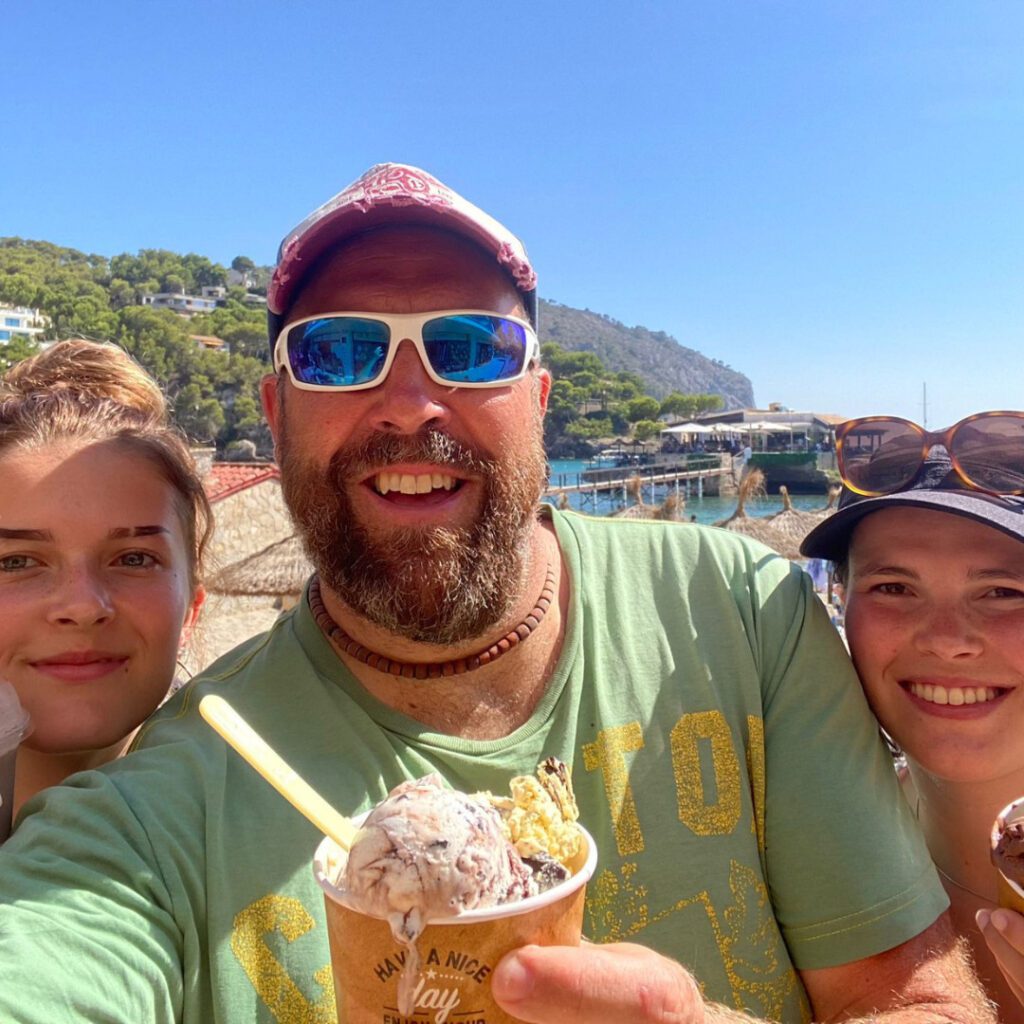
Piers Pepperell
Director
Many of you will already know our Mount Vets Director Piers; but did you know he has appeared on tv show Blind Date with Cilla Black?
Piers loves to spend a free day with his two daughters and three dogs, surfing on the North Devon Coast.
His favourite vet call out was when he was called into the waiting room and unknown to him at the time, but he then met his wife to be. She had brought in her eight baby bunny rabbits, which led on naturally to a 10-minute chat about pig wormers and her asking Piers out on a date.
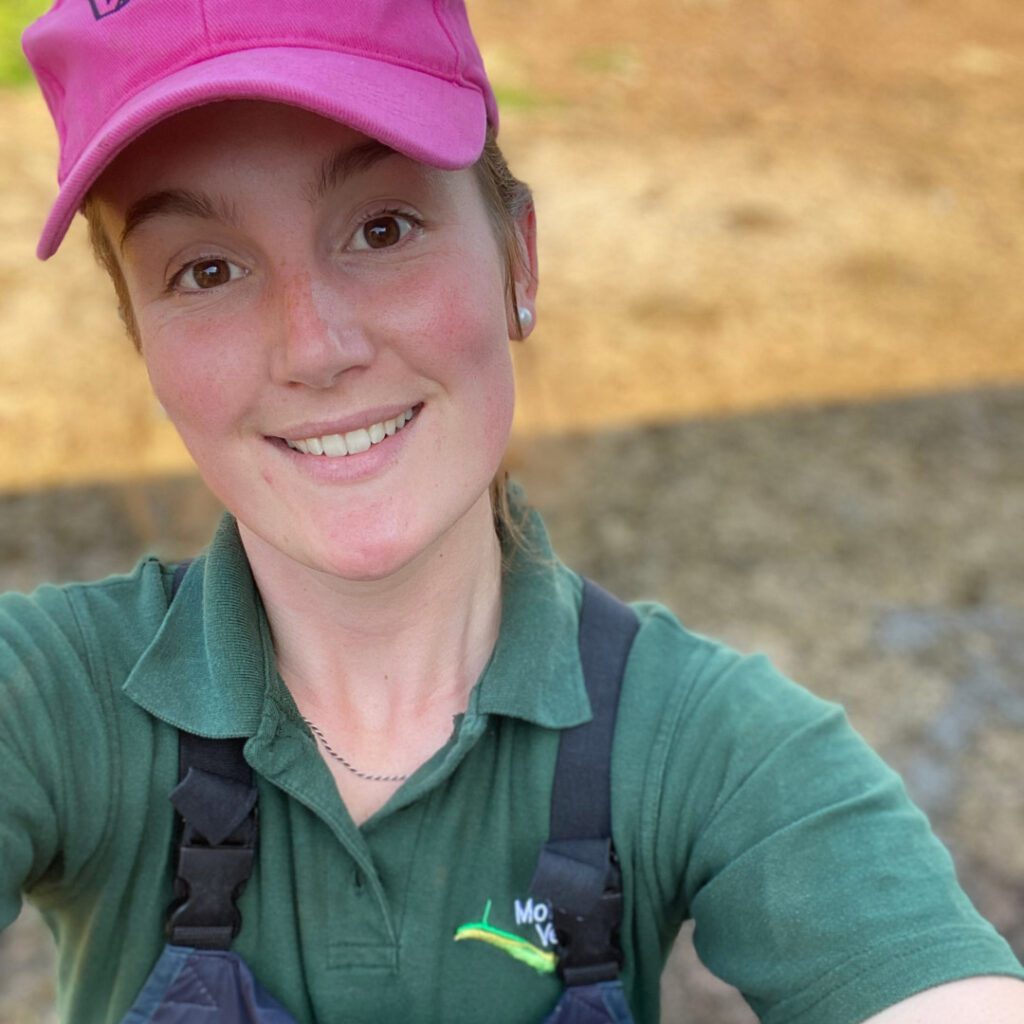
Pip White
Vet
Pip is one of our large animal vets. If you’ve met her, you will probably know how much she loves her cows. So much so, that she loves to spend her free time at home with her cows! That, or in the showring showing them. 🐮
Pip graduated as top student in her year from the University of Surrey.
Her favourite song is Mr Brightside by the Killers.
Have a question about any of the topics covered in this newsletter?
If you need any assistance with the topics covered in this newsletter, please do not hesitate to get in touch with our experienced farm vets who will be able to help. Call 01823 662286, or contact us here.
